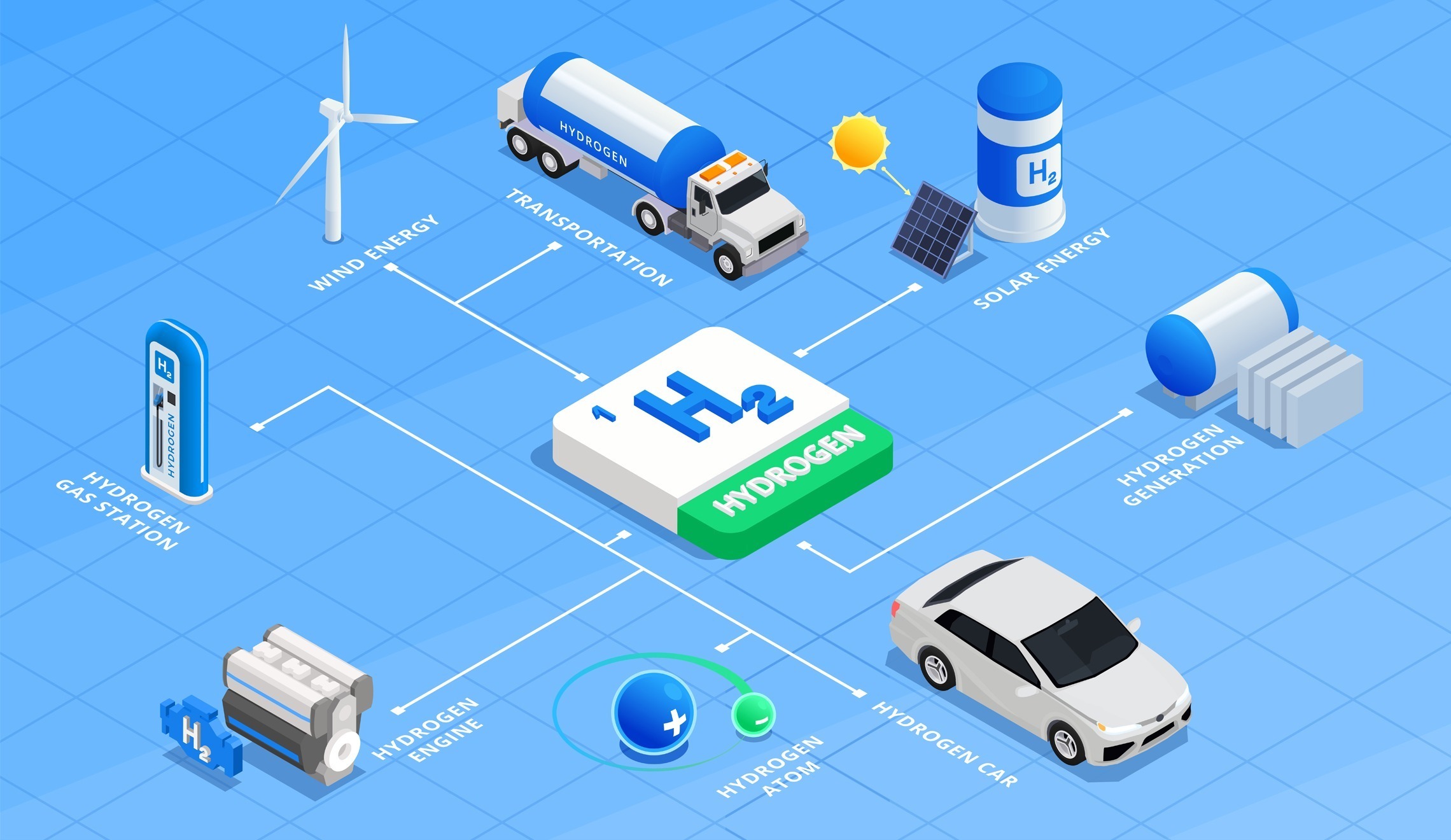Hydrogen fuel cells are becoming increasingly popular as an alternative source of energy. This is because hydrogen is a clean and renewable fuel that does not produce harmful emissions. Fuel cells are an electrochemical device that converts the chemical energy of hydrogen fuel into electricity. This technology has the potential to transform the global energy system and reduce our dependence on fossil fuels. In this blog, we will discuss the role of hydrogen fuel cells in the global energy system and their potential impact on the environment.
Hydrogen Fuel Cells – How do they work?
A fuel cell is a device that converts the chemical energy of a fuel into electrical energy. In a hydrogen fuel cell, the fuel is hydrogen gas. The device consists of an anode and a cathode separated by an electrolyte. Hydrogen gas is fed into the anode, and oxygen from the air is fed into the cathode. When hydrogen gas comes into contact with the anode, it splits into protons and electrons. The protons pass through the electrolyte to the cathode, while the electrons flow through an external circuit, generating an electric current. At the cathode, the protons and electrons combine with oxygen to form water vapor, which is the only emission from the fuel cell.
Also Read: How GIS Technology can be Beneficial For Enterprises
Hydrogen Fuel Cells in the Global Energy System
Hydrogen fuel cells have the potential to play a significant role in the global energy system. There are several reasons for this:
Energy Security
Hydrogen is abundant in the universe, and it can be produced from a variety of sources, including water, natural gas, and biomass. This makes it a reliable and secure source of energy.
Clean Energy
Hydrogen fuel cells produce electricity without emitting harmful pollutants or greenhouse gases. The only byproduct of hydrogen fuel cells is water vapor, making them a clean energy source.
Scalability
Hydrogen fuel cells can be scaled up or down to suit different energy needs. Small fuel cells can be used to power portable devices like laptops and cell phones, while larger fuel cells can be used to power homes, buildings, and even entire cities.
Versatility
Hydrogen can be used in a variety of ways, making it a versatile fuel source. It can be used to generate electricity, heat buildings, power vehicles, and even produce fertilizers.
Efficiency
Hydrogen fuel cells are highly efficient, converting up to 60% of the energy in hydrogen fuel into electricity. This is significantly more efficient than combustion engines, which typically convert less than 40% of the energy in fossil fuels into mechanical energy.
Also Read: Role of Electric Vehicle in the Energy Transition
Challenges in the Adoption of Hydrogen Fuel Cells
Despite the many advantages of hydrogen fuel cells, there are still several challenges that must be addressed before they can be widely adopted in the global energy system. These challenges include:
Cost
Hydrogen fuel cells are still more expensive than traditional energy sources, and the cost of producing hydrogen fuel is also relatively high.
Infrastructure
To support widespread adoption of hydrogen fuel cells, significant investments will be needed in infrastructure, including hydrogen production, storage, and transportation.
Safety
Hydrogen is a highly flammable gas, and there are concerns about the safety of storing and transporting large quantities of hydrogen.
Public Perception
There is still a lack of public awareness and acceptance of hydrogen fuel cells, which could hinder their adoption.
Competition
Hydrogen fuel cells face competition from other clean energy sources, such as solar and wind power, which are also becoming increasingly cost-competitive.
Despite these challenges, significant progress has been made in the development of hydrogen fuel cell technology, and many governments and companies around the world are investing in research and development to further improve the technology.
Also Read: Challenges and Advancements in Electric Vehicle Battery Technology
Applications of Hydrogen Fuel Cells
Hydrogen fuel cells have a wide range of potential applications across different sectors. Here are some of the main applications of hydrogen fuel cells:
Transportation
One of the most promising applications of hydrogen fuel cells is in transportation. Fuel cell vehicles (FCVs) use hydrogen fuel cells to generate electricity and power an electric motor. These vehicles emit only water vapor, making them a clean and environmentally friendly alternative to traditional vehicles that run on fossil fuels.
Stationary Power
Hydrogen fuel cells can also be used to provide stationary power for buildings and other structures. Fuel cells can be installed in a variety of settings, from homes and businesses to hospitals and data centers. This can help reduce reliance on the electrical grid and provide backup power during outages.
Portable Power
Hydrogen fuel cells can also be used to provide portable power for electronic devices such as laptops, cell phones, and tablets. These devices can be powered by small fuel cells that are compact and lightweight, making them ideal for use in remote or off-grid locations.
Industrial Applications
Hydrogen fuel cells can be used in a variety of industrial applications, including powering forklifts, providing backup power for critical systems, and even generating heat for industrial processes.
Aerospace
Hydrogen fuel cells are being explored as a potential power source for space exploration missions, where they could provide a reliable source of power for spacecraft and habitats.
Overall, hydrogen fuel cells have the potential to play a significant role in the global energy system, providing clean, reliable, and efficient energy across a range of applications. While there are still some challenges that need to be addressed, the continued development and adoption of hydrogen fuel cell technology could help transform the way we power our world.
Also Read: Information Technology to Support the New Values of the EV
Conclusion
Hydrogen fuel cells have the potential to revolutionize the global energy system, offering a clean, renewable, and versatile source of energy. With its abundance and scalability, hydrogen could provide a reliable and secure source of energy, reducing our dependence on fossil fuels and helping to address climate change. While there are still some challenges to overcome, the continued investment in research and development, as well as the adoption of supportive policies, could accelerate the development and deployment of hydrogen fuel cell technology. As we work towards a more sustainable future, hydrogen fuel cells are poised to play a key role in the transition towards a cleaner and more resilient energy system.
If you are also interested in taking an initiative in the hydrogen fuel business market and looking for industry experts, then do not hesitate to contact us at support@aeologic.com









